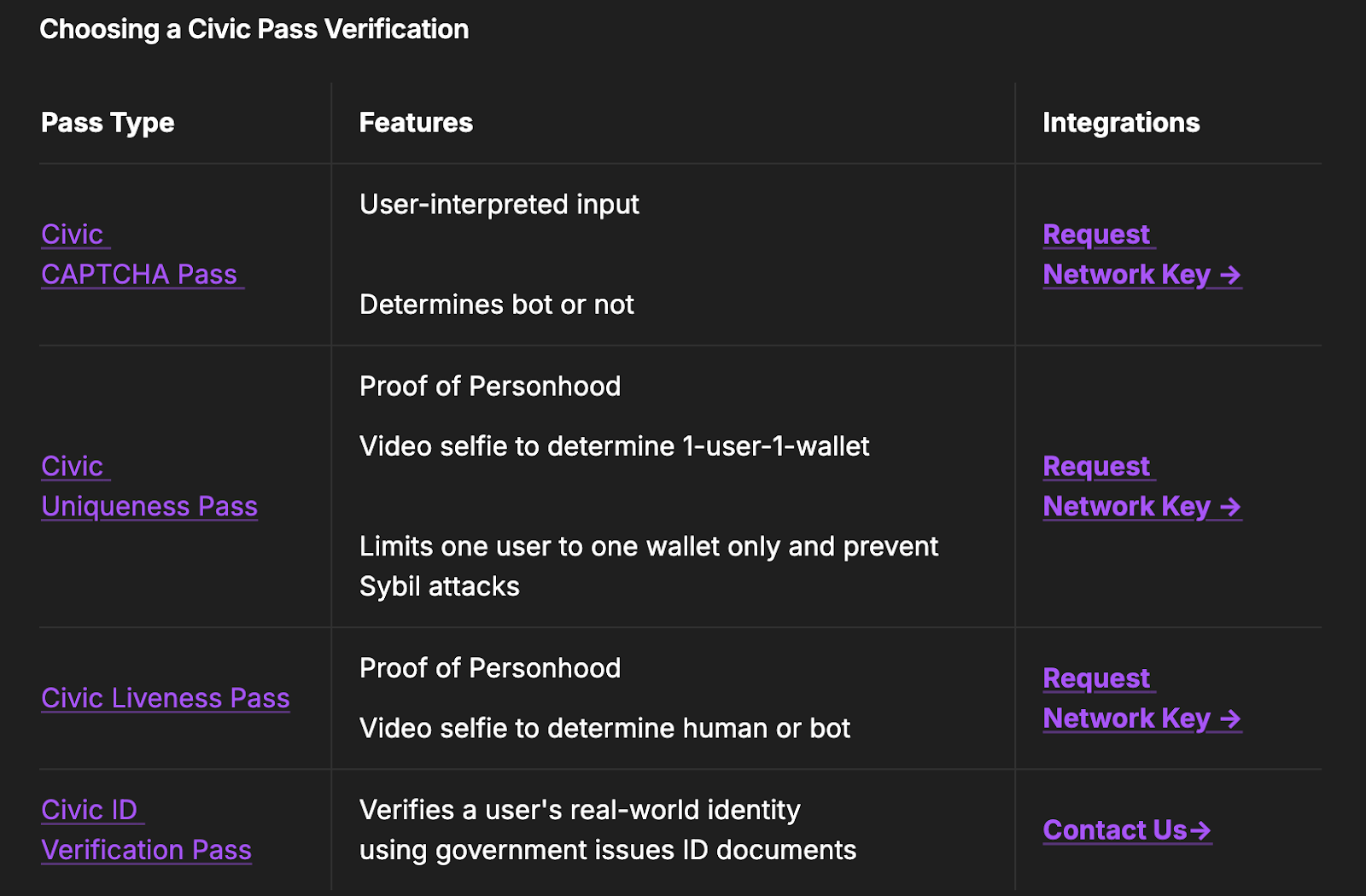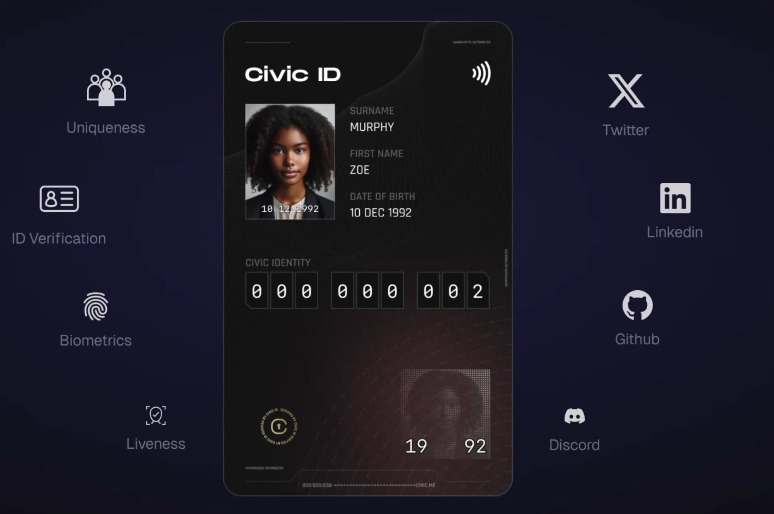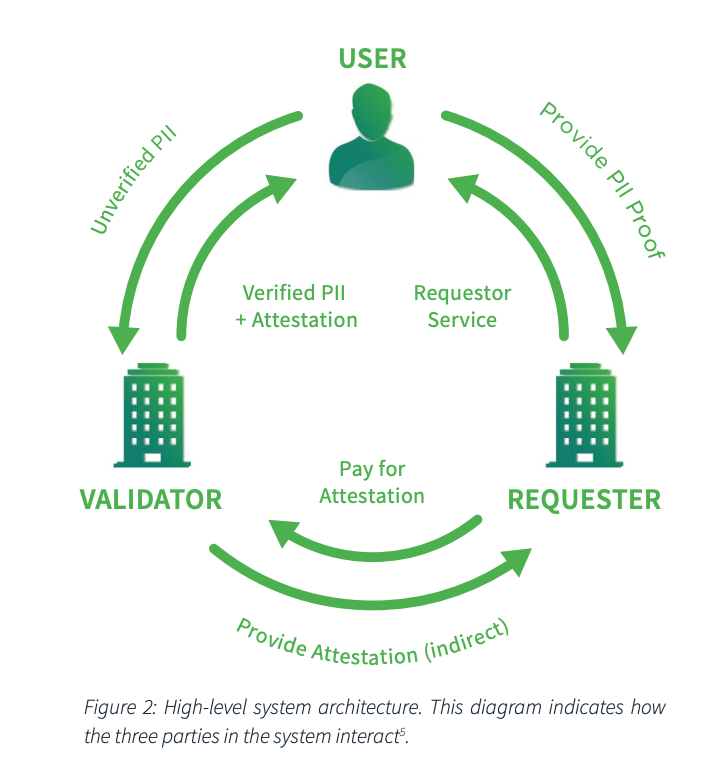Civic (CVC): Streamlining Identity Verification Across Chains
In the web3 space, crypto users have long relied on their wallet's public key as their digital identity when transacting on various blockchain platforms. While this form of identity is secure and private, it also poses the problem of overreliance: if users lose access to their wallets, they lose their identity and any painstakingly cultivated reputation.
As the number of crypto scams and frauds increases, this overreliance on a single identity approach makes users more vulnerable, highlighting the need for solutions that protect personal identity information and reinforce their web3 reputation.
For this reason, Civic network has created a digital identity management solution to provide you with varied ways to own your identity. The platform offers a combination of identity solutions, including a soulbound token (SBT), Civic Pass and Civic ID.
Let’s explore Civic’s approach to web3 identity management.
Key Takeaways:
Civic provides users with an identity management platform to help fight the challenges presented by identity theft, online scams and fake accounts.
Its solutions include the Civic Pass, a physical Civic ID and a comprehensive identity system comprising Users, Requesters and Validators.
Civic’s native token is CVC, which is available as a Perpetual contract on Bybit.
What Is Civic?
Civic is a decentralized identity management platform that provides an avenue to tokenize one’s identity that makes it verifiable, private and flexible for use across the web3 landscape. Civic aims to provide crypto users with various options to identify themselves around the crypto space, apart from the traditional wallet public key that’s often used when transacting.
Civic was founded by Jonathan Smith and Vinny Lingham, who work with a team of over 25 members to bring the project’s vision of a decentralized identity platform to life. Civic debuted as an anti-fraud platform in 2015, but it incorporated more use cases as its identity management platform continued to expand. To make the project more scalable and affordable, Civic migrated from the Ethereum network to Solana.
Civic’s secure identity platform uses the concept of Proof of Personhood (PoP), which establishes that a person is linked to a single wallet operated by a human. This mechanism targets institutions looking to ascertain that a given identity doesn’t belong to a bot or an AI agent. PoP can be utilized by decentralized apps (DApps) to ensure humanity, especially for activities such as DAO voting.
Civic’s PoP mechanism has been integrated into its Civic Passes, which are non-transferable tokens issued to a user’s wallet once their credentials have been verified. Some of the use cases for Civic Passes include:
Enabling on-chain accredited investor verification for decentralized finance (DeFi)
Verifying your game identity to ensure fair competition and prevent abuse
Verifying identity for airdrops and fair distribution
Combating Sybil attacks in DAO governance
One example of a DAO governance platform that uses Civic Passes is Realms on Solana, with which you can easily integrate your Civic Pass into your DAO without the need for any coding.
Civic Key Features
Civic Pass
Civic Pass is a tokenized form of identity that helps people privately manage and verify their identity across different blockchains. A Civic Pass is a form of soulbound token (SBT), since it represents a certain aspect of your digital identity. As an SBT, it’s non-transferable and can only be issued once a person’s identity has been verified. Civic Passes are available on Solana and 11 other Ethereum virtual machine (EVM)–compatible blockchains — Arbitrum, Avalanche, Base, BNB Chain, Ethereum, Fantom, Optimism, Polygon, Polygon zkEVM, XDC and X Layer.
Types of Civic Passes
A Civic Pass is split into two types, Standard and Custom. The Standard Pass itself is further categorized into CAPTCHA Pass, Liveness Pass, Uniqueness Pass and ID Verification Pass.
Each pass has its own way of determining whether you’re a human or a bot. The CAPTCHA Pass requires you to complete a challenge-response test; the Liveness Pass and Uniqueness Pass both require a video selfie; and the ID Verification Pass requires you to pass a government-issued ID check.
Civic’s Custom Pass is created especially for DeFi platforms to streamline compliance. It allows DApps to enforce compliance rules on-chain without Civic’s user interface (UI). Developers who create Custom Passes can configure rules and functions according to their own logic, before integrating the Civic API to issue a Custom Pass to their user's wallet. An on-chain library powered by smart contracts is also required to help check the validity of the Civic Pass during program execution.
Types of Third-Party Integrations
There are four types of third-party integrations of Civic Passes, as follows.
Solana Token Extensions: This feature allows you to build custom tokens on Solana. A Civic Pass can be integrated to provide a flexible and simple way of adding identity verification to such token extensions.
Realms: You can add a Civic Pass using the Realms plugin, which will help verify identities of DAO participants.
Discord Civic Pass Bot: By integrating this type of Civic Pass, Discord server members can gain special access to certain roles based on the Civic Pass entrenched in their Solana wallet.
Candy Machine V3: Civic Pass is integrated into Metaplex's Candy Machine v3 protocol, allowing users to protect their non-fungible token (NFT) mints by permissioning with Civic Pass and Candy Guard, which works together with Civic Pass to verify NFT minters in real time to prevent bots and underage minters.
CIVIC ID
Civic ID is a versatile identity system designed to power human identity verification. It consists of three ID components: analogue (physical card), digital and mobile identity. Civic ID solves challenges such as AI deepfakes, catfishing, sim swaps, sybil attacks, identity fraud, account takeovers and unattributed AI content. With Civic ID, you can verify your identity across the web, secure your identity on your mobile wallet and control the data that you share.
Civic released a physical Civic ID card in March 2024 that’s specially designed to fight AI-driven identity fraud, such as “face farming” and account takeovers. Users in over 190 countries can receive this global ID card by verifying their identity at a physical address through authorized dealers. The Civic ID card can also be customized and co-branded for an institution or company looking for a comprehensive human verification system.
How Does Civic Work?
Civic uses an intricate interaction between Users, Requesters (service providers) and Validators to manage identities effectively and securely. A User approaches a Requester on the Civic platform for identity services.
Upon receiving the request, the Requester presents the User with a list of Validators and the Personally Identity Information (PII) needed. If the User has the acceptable PII set by the Validator, they can accept the attestation with the Validator and send the PII to the service provider. Upon receiving the PII and confirming its authenticity, the Validator will attest to the accuracy of this information and record it on the blockchain. The original remains on the User's mobile in an encrypted form.
To provide an identity verification service, the Requester and Validator have to agree on a price to attest the PII. If they’re in agreement, the Requester then deposits CVC tokens, which are held in escrow by a smart contract. The User then sends the necessary PII to the Requester, who forwards it to the Validator for attestation. Once the Requester finds the attestation acceptable, the Requester furnishes the User with the desired service. The CVC tokens are then released from escrow and paid to the Validator.
What Is the Civic Crypto Token (CVC)?
CVC is the native utility token for the Civic ecosystem. Its primary role in the Civic ecosystem is to incentivize participants by rewarding good behavior on the protocol, especially accuracy in the identity verification information provided (Validators are paid using CVC tokens). To become a Validator, one needs to stake a minimum amount of CVC tokens. Transactions are also paid for using CVC tokens.
As of Oct 30, 2024, CVC has a total supply of 1 billion tokens, with a circulating supply of 802 million and a 24-hour trading volume of over $14 million.
How to Buy Civic (CVC)
You can buy CVC as a USDT Perpetual contract on Bybit (CVCUSDT). To trade CVC, follow these simple steps:
1. Go to the Bybit homepage and click on Derivatives in the navigation bar. Choose the CVC Perpetual Trading contract.
2. Move to the right side of the page, where you’ll find the Order zone. You’ll find three types of orders — Limit Order, Market Order and Conditional Order.
3. Proceed to select your desired leverage.
4. Select the order type.
5. Enter your desired price and quantity.
6. Set Buy/Long with TP/SL, or Sell/Short with TP/SL (this step is optional).
7. Clickon Buy/Long or Sell/Short.
Civic (CVC) Price Prediction
As of Oct 30, 2019, CVC’s price is $0.129, a 90.4% drop from its all-time high (ATH) of $1.35 on Jan 03, 2018, and an over 1,000% increase from its all-time low (ATL) of $0.011 on Mar 13, 2020.
Price prediction experts are slightly bullish on the future price of CVC. According to price experts at CoinCodex, CVC could reach a maximum price of $0.29 in 2025 and $0.37 in 2030. Experts at another price prediction platform, DigitalCoinPrice, are even more bullish over the long run, believing CVC’s price will hit $0.33 in 2025 and increase to $0.97 by 2030.
While these price forecasts are optimistic, they aren’t financial advice, and shouldn’t be taken as a guarantee of the future price of CVC.
Is Civic CVC a Good Investment?
While Civic initially presented itself as an anti-fraud platform, the demand for a universal digital identity management solution has seen the Civic project evolve to encompass a broader scope in the niche. Its versatile identity solutions are timely, especially due to the increased cases of identity theft and scams driven by the capabilities of artificial intelligence (AI).
Moreover, institutions, companies and web applications are increasingly seeking to verify identities before engaging with users. The Civic ID is one such product that allows them to carry out human verification.
Some projects that have already integrated the Civic ID system include Polygon ID, Realms and Metaplex, as well as supporting blockchains like Ethereum, Solana, Arbitrum and XDC. Furthermore, the launch of the physical Civic ID will help solve challenges, such as face farming and social media account takeovers, since it will be possible to prove the authenticity of individuals’ identities.
The wide range of identity verification solutions provided by Civic provides an alternative to the traditional wallet public key, which web3 users have had to disproportionately rely on. Civic provides an extra identity layer that’s not only user-friendly, but also offers flexible options for managing one's identity. As web3 identity needs continue to evolve, projects such as Civic could experience phenomenal growth, potentially driving the native CVC token’s price over time.
While Civic sounds like a good investment, the crypto market can be highly volatile, with many rug pulls and other scams in the space. We highly recommend that you do your own research before investing in Civic or any other crypto project.
Closing Thoughts
Civic has presented the web3 space with a dynamic identity management platform that’s powered by the CVC token. With the worrying rise of online scams through identity theft, especially due to the capabilities of AI, Civic provides users with superior control over their identities. It also provides DeFi apps, gaming platforms and DAOs a decentralized way to verify human identity that eliminates AI agents and bots. For these reasons, the CVC token is one to watch as the demand for identity solutions continues to rise in the web3 space.
#LearnWithBybit





